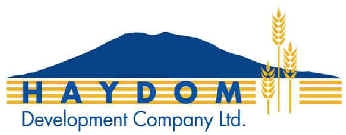
E- mail: post@haydom-dc.com
 |
Haydom
Development Company (HDC) Ltd would appreciate getting in touch with
individuals or organisations wanting to support one or more of the HDC
activities or becoming partners.
E- mail: post@haydom-dc.com |
| Home | Board | History | Visions, objectives and targets | Experieances |
|
Will the Tanzanian authorities repossess the Mulbadaw farm?Posted 10.05.2013 Below you can read an article published a few months ago in the Tanzanian newspaper "The Citizen". You can also read it on The Citizens homepage here. Wheat
farms lie idle for decade
Posted by the Citizen Monday,
December 10, 2012 By Zephania Ubwani The Citizen Reporter, Arusha. Residents of Hanang District in Manyara Region are
divided over the fate of the formerly state-owned wheat farms that have
been abandoned following the collapse of the Canadian-funded scheme
slightly over 10 years ago. While the livestock keepers, supported by activists,
want the farms sub-divided among the locals, others are proposing that
they should be leased to serious investors for commercial farming. The farms, which were managed by the defunct National
Agricultural and Food Cooperation (Nafco), covered about 100,000 acres
during their peak, meeting at least one third of the wheat requirement in
the country. Many of them have been literally abandoned after the
Canadians left amidst wrangling over their fate by varying parties,
including the livestock keepers who were evicted from the land in the
1970s. Although government says some of the farms have been
privatised, stakeholders in the district and elsewhere are questioning
this as they cannot see them becoming productive as was the case decades
ago. When he visited Hanang two months ago, President
Jakaya Kikwete wondered why the disputes over the ownership of the farms
have not been resolved and the crop fields put to use for the benefit of
the nation. In interviews conducted by The Citizen last
month, it became clear there was fatigue on the part Hanang residents over
the disputed farms, calling on relevant authorities to intervene. “These farms must be revived because at full
production they can meet at least 60 per cent of the country’s wheat
needs,” lamented Humphrey Kweka, a retired public servant at Katesh. He argued that wrangling over the future of the farms
would not help the people of Hanang or the nation and instead, would
condemn the highly productive area to under utilisation to the detriment
of the nation. Mr Kweka, a former land development officer, took
swipe at politicians in Hanang who sought popularity from the voters by
falsely promising they would do something about the farms. “I recall Rose Kamili (the Chadema Special MP) has
been agitating for the return of the farms to wananchi. At one time,
Sumaye (the former prime minister) was blamed for the abandonment of the
farms. “I don’t support either side because I know
politicians are often bent on simply pleasing voters,” he said,
suggesting that the farms on the Bassotu plains should be utilised to make
the country self-sufficient in wheat. Currently, Tanzania imports about 80 per
cent of its wheat requirement. Mr Kweka noted that there were many experts
trained during the Tanzania-Canada Wheat Programme and machinery is lying
idle. The district chairperson of the Tanzania
Chamber of Commerce, Industry and Agriculture (TCCIA) Jackson Mtese,
supported the argument, saying the farms should be availed to investors. However, a former district administrator
for Hanang, Mr Mefunya Gapjojiga, warned that it would be difficult to
offer the farms to non-local investors without resolving “once and for
all” the long-standing land conflict in the area. He told The Citizen that the conflict
between the pastoralists and farmers as regards the farms, on the one
hand, and between wananchi and the authorities, on the other, was likely
to scare away potential investors, a situation compounded by poor weather. Contacted yesterday to explain how the
district authorities have responded to the President’s call to revive
the farms, the Hanang District executive director, Mr Felix Mabula said he
was not ready to discuss the matter. “This is not to say nothing is being done.
But I can only talk to you on a working day. I have a strategic plan but
currently I cannot divulge any details as I am out of office”, he
pointed out. Early this year, the Hanang MP and minister
of State in the Prime Minister’s Office (Investments and Empowerment) Dr
Mary Nagu, warned that the government would repossess the farms if the
firms failed to run them profitably. Speaking at a public rally at Bassotu, a
few kilometres from the abandoned farms, she said there was evidence that
some of the companies or individuals who took over the farms have failed
to develop them. She noted that when the government
privatised them, it expected the new investors would revamp production of
the estates. The estates are: Murjanda, Warret, Gawal, Setchet,
Gidagamowda, Mulbadaw and Bassotu plantations. A few years ago the authorities announced it was handing over local people, two of the farms, Warret and Gawal, which covered a total of 14,000 acres. Comments by HDCWhat
is appropriate action? It’s
no surprise for HDC that the NAFCO- farms, including Mulbadaw aren’t
managed according to the conditions in the purchase
contracts obtained from the Tanzanian Government. If someone buys a
farm in Norway and don’t apply to the conditions
set by the Norwegian authorities in the purchase
contracts, he or she will be obliged to sell the farm. We can see
no reason why this shouldn’t be the case also I Tanzania.
|